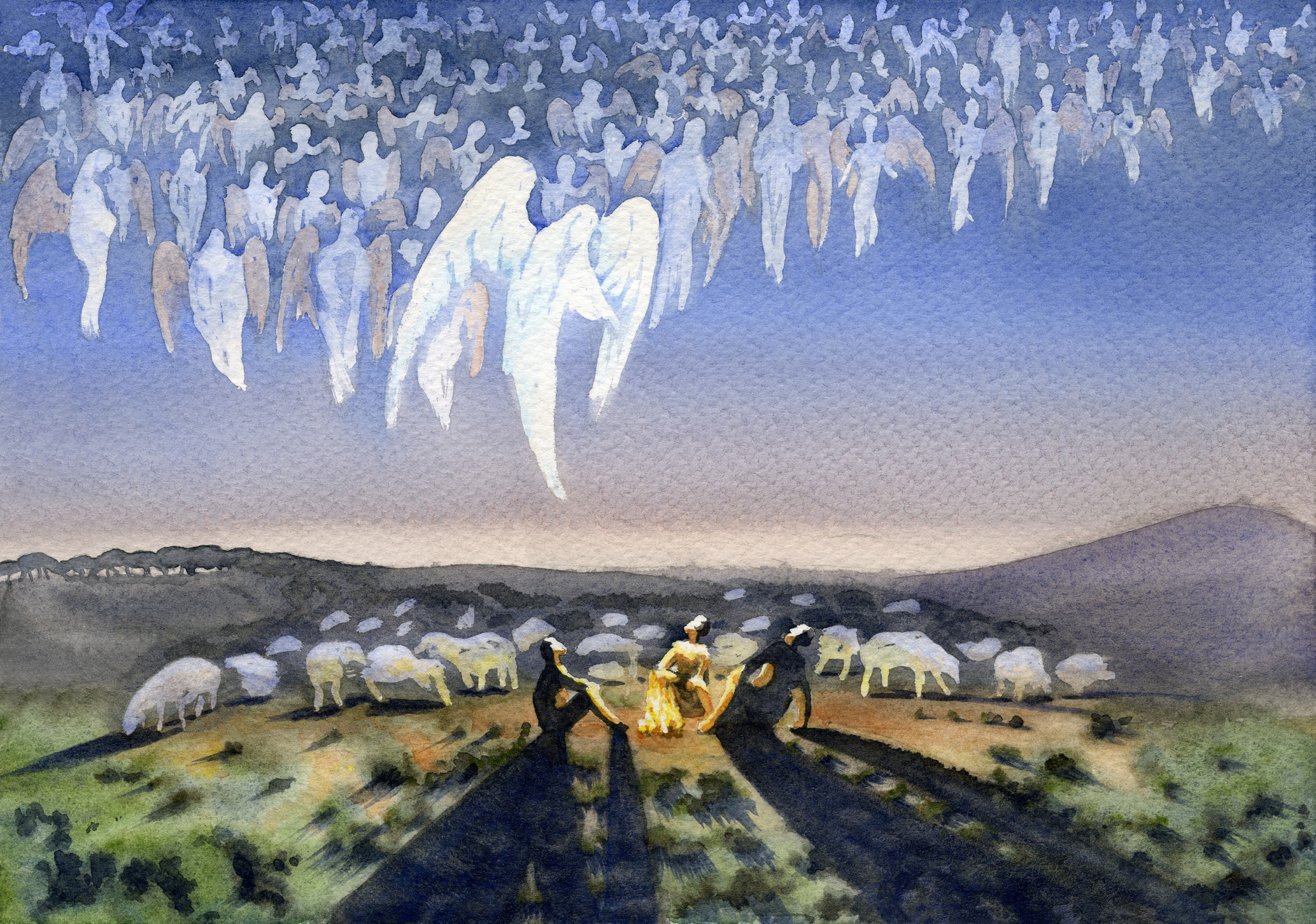Evaluating Angelic Apperances
Yuletide art often displays the angel of this passage in the air above the shepherds. However, the stood before them of Luke 2:9 does not indicate that the heavenly messenger had an elevation greater than that of the shepherds. Absent from the text is any mention of wings, hovering (See 1 Chronicles 21:15-16), or clouds. I do not believe that the author’s command of Greek and attention to detail leave this open to interpretation. When Luke has meant stood over he has clearly conveyed that idea. E.g., later in the same work (4:39) Luke uses the same verb and a preposition to communicate that the Lord stood over Peter’s sick mother-in-law. In the material that concludes Luke’s gospel more angels appear (24:4); the same verb that was translated stood before them, now in the plural, is used in the same way. These angels, appearing to activate immediate obedience in the disciples, are on the ground with the men to whom they are speaking.
In general when angels appear for judgement they do not make themselves available for conversation; they are not present to communicate but to condemn. In passages where angels appear in the air they are not merely aloft – they are agents of judgement (1 Chronicles 21:16) or positioned against the enemies of God (Revelation 7:1-2; 8:5,13, 14:1-19). Notable exceptions are found in the passage where an angel of God calls to Hagar out of heaven and later to Abraham (Genesis 21:17; 22:11). In these exceptions it does not say that the angel appeared but called out. But you will say, “What about Balaam’s donkey?” (Numbers 22:22-33) And to this I will say that the Angel does not appear to Balaam. It was the donkey that saw the angel standing against the wayward prophet.
When heaven’s ministering spirits show up on the ground (Daniel 8:15-17) or in a dream they are present to help men (Genesis 31:11; 32:1; Exodus 3:2; Judges 13:3; Matthew 1:20; 2:13; 2:19; 28:5; Luke 1:11-13; 1:28-30; 2:9; John 20:12; Acts 5:19; 7:30, 35; 10:3; 11:13; 12:7; 27:23). Since this note was first penned I have given more thought to the subject. Furthering the argument that an angel standing with or before men is present to help, are the prior appearances of Gabriel in Luke’s gospel. There are two instances that should be considered. First, there is the appearance of Gabriel to Zacharias.
11 Then an angel of the Lord appeared to him, standing on the right side of the altar of incense. 12 And when Zacharias saw him, he was troubled, and fear fell upon him. 13 But the angel said to him, “Do not be afraid, Zacharias, for your prayer is heard; and your wife Elizabeth will bear you a son, and you shall call his name John. (Luke 1:11-13)
The angel appears for a meeting with a particular person: appeared to [Zacharias]. And the participial phrase describing how he appears says that he was standing on the right side of the altar of incense. The angel has made himself known to Zacharias through a visible appearance and he is standing on the ground in the Holy of Holies. They are literally on common ground.
Second, there is the appearance to Mary. That is, there is another appearance of the same angel to a person; Gabriel appears to Mary six months after the appearance to Zacharias. This same angel is said to come in (Luke 1:28) and then later to depart from her (Luke 1:38). Nothing is said about whether or not he was standing on the ground. However, unless the poor virgin girl in Nazareth lives in a place with huge vaulted ceilings, the angel is near or on the ground. We will not argue from silence (argumentum ex silentio), since the passage does not explicitly say that the heavenly messenger had his feet on the earth. But it is not unreasonable to think that he did.
Finally, at no point did the angels that appear in the advent story try to get attention for themselves. They did not encourage future communication with themselves, ask for worship, or indicate that they would be an ongoing source of enlightenment. The angels of God do not distract His people from Himself; they appear to promote obedience and devotion to God alone. Angels that seek or accept devotion are demonic (Isaiah 14:12-17; Matthew 4:8-11)!
Does it matter? Is there any relevance in this rumination to our day-to-day efforts to live effectively in the service of Jesus? The significance may be in helping me to interpret the meaning of visits from angels. Because, to be sure, they are continuing to visit us (Acts 12:7; Hebrews 13:2). (No, I am not preoccupied with the appearance of angels or trying to explain the community and operations of beings not of this world. I am merely working with Scripture to uncover guidelines for evaluating visits by angels.) Recently, there have been people claiming that orbs of light in the sky might be angels. They have even posted videos of communication with these things; in one case the light seems to respond. (Note: the person presenting the material is in the active practice of witchcraft and other activities expressly prohibited by God.) Does it matter? Consider the following as assessment guidelines:
Angel Appearance Assessment Guidelines
- Angel Appearance Assessment Guideline 1 – If the angel is in the air above me, based on the Scriptures, this is an indicator that they are not visiting to communicate and are not promoting my personal welfare.
- Angel Appearance Assessment Guideline 2 – If the angel appears on the ground and talks to me, they are obviously wanting to communicate and, based on the Scriptures, they may be here to help.
-
Angel Appearance Assessment Guideline 3 – The angel must not seek attention for itself, try to get me to stay in communication with itself, or promote spiritual ideas that indicate a better life that is not centered on Christ. Angels of God do not self promote or distract from the gospel.


